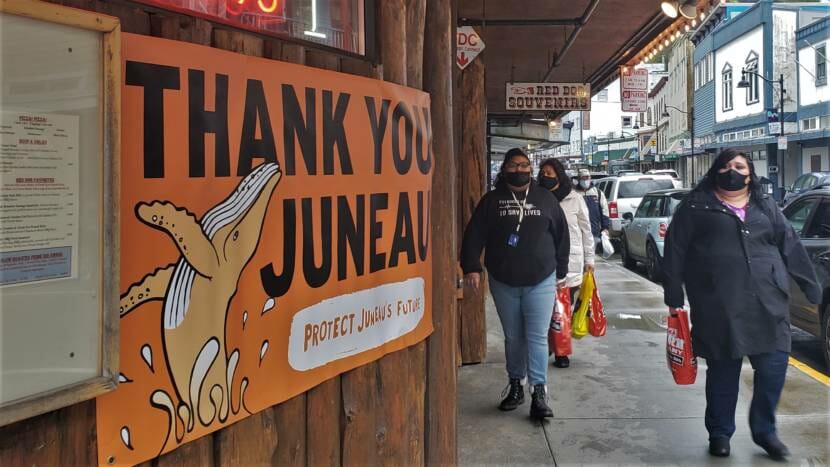
A deadline has passed for local candidates and issues groups all over the state to disclose their campaign finances ahead of local elections on Oct. 5.
But the public probably will never know exactly who paid what for the campaign that helped quash a ballot initiative effort to limit cruise ships in Juneau. That’s because campaign finance disclosure laws wouldn’t apply in this case until after it cleared the signature-gathering stage.
The group Protect Juneau’s Future ran the “don’t sign” campaign this spring, opposing three proposed ballot initiatives to limit cruise ships in Juneau.
The campaign’s sunny, orange motif popped up online and all over town in mailers, storefront posters, even at restaurants and bars as those little, folded tabletop adverts. Along with information about the impacts limiting the cruise industry might have.
The campaign was successful. None of the proposals got the signatures needed to get on the ballots recently mailed out.
But who paid for the campaign? Laura Martinson is a co-chair of the group.
“We were so proud of our support that we actually published it in the Juneau Empire twice,” Martinson said. “Our supporters were completely local, every single one of them was from Juneau. And that was our goal from the start.”
Martinson said that also meant excluding the interest with the deepest pockets and the most to lose: the cruise lines. She said her group wanted to keep the debate among locals.
Martinson did share that her group got contributions from 36 individuals, 28 businesses, three business-related nonprofits and one union.
At first, she thought her group would have to file more detailed information with the Alaska Public Offices Commission, the state agency that serves as the clearinghouse for campaign finances.
“So this being my very first political campaign, I was actually really shocked that up until an initiative reaches the ballot, or receives enough signatures to get on the ballot, that you don’t have to disclose where your funding is coming from,” Martinson said. “I think it should be transparent from start to finish.”
Though, she said her group won’t volunteer the names of the individual donors out of respect for their privacy.
For this type of campaign, there’s also no dollar limit to how big contributions can be. Martinson wouldn’t share the actual dollar amounts raised, individually or in total. But she said most contributions were small.
“These are $25 donations for the most part that we’re talking about. I mean, these were, these were lots of little, handwritten checks on rainy sidewalks,” Martinson said. “And, you know, young people in the industry asking if we knew how to use Venmo. I mean, it was a very small scale.”
Karla Hart leads Juneau Cruise Control, the group that was trying to collect signatures for the proposals to limit cruise ships. Hart’s group didn’t have to disclose any of its finances, either. That said, there isn’t much to report.
She says her group didn’t fundraise at all. She and a few volunteers spent a total of about $600 out of their own pockets. She said they paid for video conferencing services, a website, some banners and a fee for some tax paperwork.
Campaigning around Juneau’s cruise ship limit ballot questions went very differently than in Key West, Florida, which inspired Hart.
There, the Miami Herald revealed the cruise industry used “dark money” — contributions to a third party that are difficult to trace back to the source — to pay for ominous and misleading mailers that flooded Key West mailboxes.
Martinson and Hart both said they weren’t aware of any other campaigns trying to influence the ballot initiatives in Juneau.
When it comes to initiatives, referendums and recalls, the state laws about who does or doesn’t have to open up their books — and when — are pretty inconsistent. Initiatives are for creating a new law, referendums are for repealing an existing law and recalls are for booting an incumbent elected official.
For all three types of ballot measures, campaign finances must be disclosed after they’ve gathered enough signatures and the question has been placed on the ballot. But the requirement is inconsistent during signature gathering. Only statewide initiative campaigns must report their finances during the signature gathering stage. Local governments can impose their own campaign finance rules, but Juneau doesn’t.
That could change next year. A bipartisan group of lawmakers is backing a bill to make referendums and recalls at the state level, like the attempt to recall Gov. Mike Dunleavy that fizzled out last month, subject to the same disclosure requirements as statewide initiatives.
Rep. Sara Rasmussen, a Republican from Anchorage, is the bill’s main sponsor.
“I think the big thing here is a transparency issue,” Rasmussen said during a House floor debate in May. “Whichever side of an issue you fall, the important thing is to make sure that Alaskans get the transparency they deserve and knowing who is funding either position in any type of measure that goes before voters.”
In its current form, the bill only applies to ballot questions at the state level. In committee, House lawmakers briefly discussed expanding it to include local campaigns, but it didn’t go anywhere concrete.
House Bill 157 cleared the House in May in a 36-3 vote and is awaiting action in the Senate next year.
Editor’s note: This story has been updated to clarify campaign finance disclosure laws didn’t apply to the campaigns related to a ballot initiative to limit cruise ships in Juneau. The laws apply to statewide initiative campaigns during signature gathering, but the laws don’t apply to all municipal campaigns.
